Analyzing the Impact of Corporate Governance on BBC Race Relations
VerifiedAdded on 2022/11/30
|11
|3672
|496
Report
AI Summary
This report examines the effectiveness of corporate governance on race relations within the British Broadcasting Corporation (BBC). It delves into existing corporate governance policies designed to support race relations, analyzing their effectiveness and impact. The report highlights the impact of poor race relations on Black and Minority Ethnic (BME) employees, including issues of discrimination and lack of workplace progression. It reviews the BBC's initiatives, such as workforce targets and diversity programs, and explores the roles of regulatory bodies like Ofcom. The analysis includes an examination of the challenges faced by BME staff, such as unequal opportunities and instances of racial insensitivity. The report concludes with recommendations for improving corporate governance and race relations, focusing on enhancing diversity, fostering inclusive workplace culture, and ensuring equitable career progression for all employees.
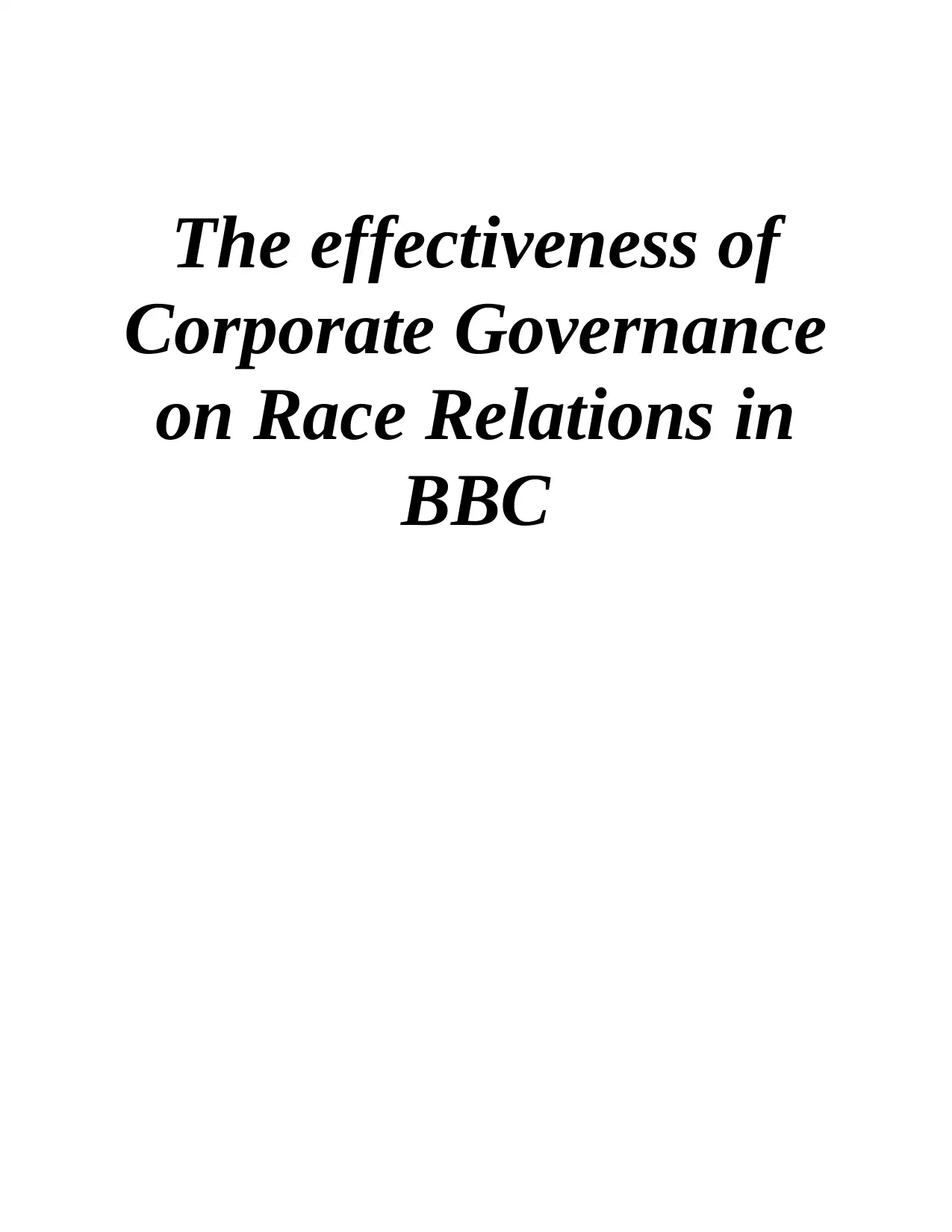
The effectiveness of
Corporate Governance
on Race Relations in
BBC
Corporate Governance
on Race Relations in
BBC
Paraphrase This Document
Need a fresh take? Get an instant paraphrase of this document with our AI Paraphraser
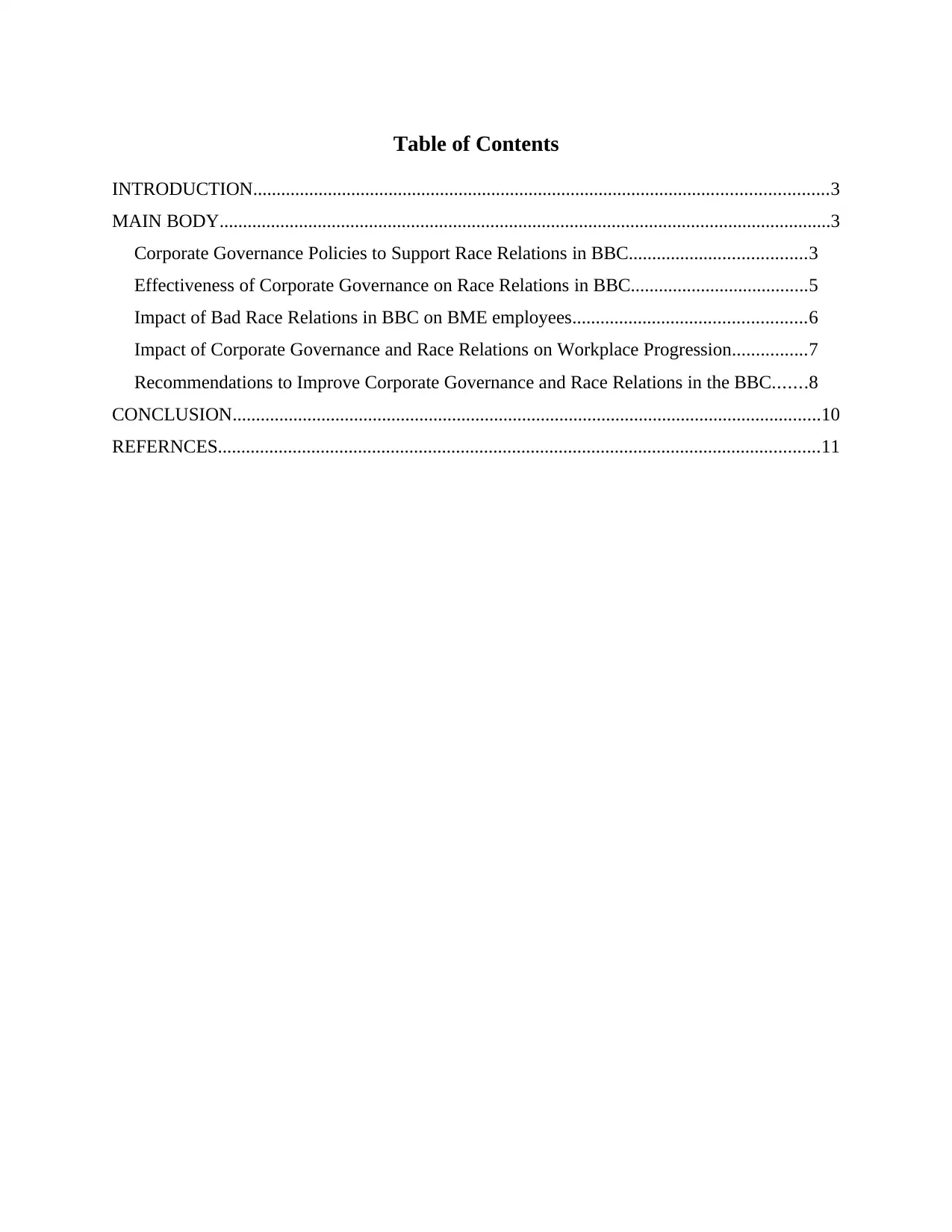
Table of Contents
INTRODUCTION...........................................................................................................................3
MAIN BODY...................................................................................................................................3
Corporate Governance Policies to Support Race Relations in BBC......................................3
Effectiveness of Corporate Governance on Race Relations in BBC......................................5
Impact of Bad Race Relations in BBC on BME employees..................................................6
Impact of Corporate Governance and Race Relations on Workplace Progression................7
Recommendations to Improve Corporate Governance and Race Relations in the BBC.......8
CONCLUSION..............................................................................................................................10
REFERNCES.................................................................................................................................11
INTRODUCTION...........................................................................................................................3
MAIN BODY...................................................................................................................................3
Corporate Governance Policies to Support Race Relations in BBC......................................3
Effectiveness of Corporate Governance on Race Relations in BBC......................................5
Impact of Bad Race Relations in BBC on BME employees..................................................6
Impact of Corporate Governance and Race Relations on Workplace Progression................7
Recommendations to Improve Corporate Governance and Race Relations in the BBC.......8
CONCLUSION..............................................................................................................................10
REFERNCES.................................................................................................................................11
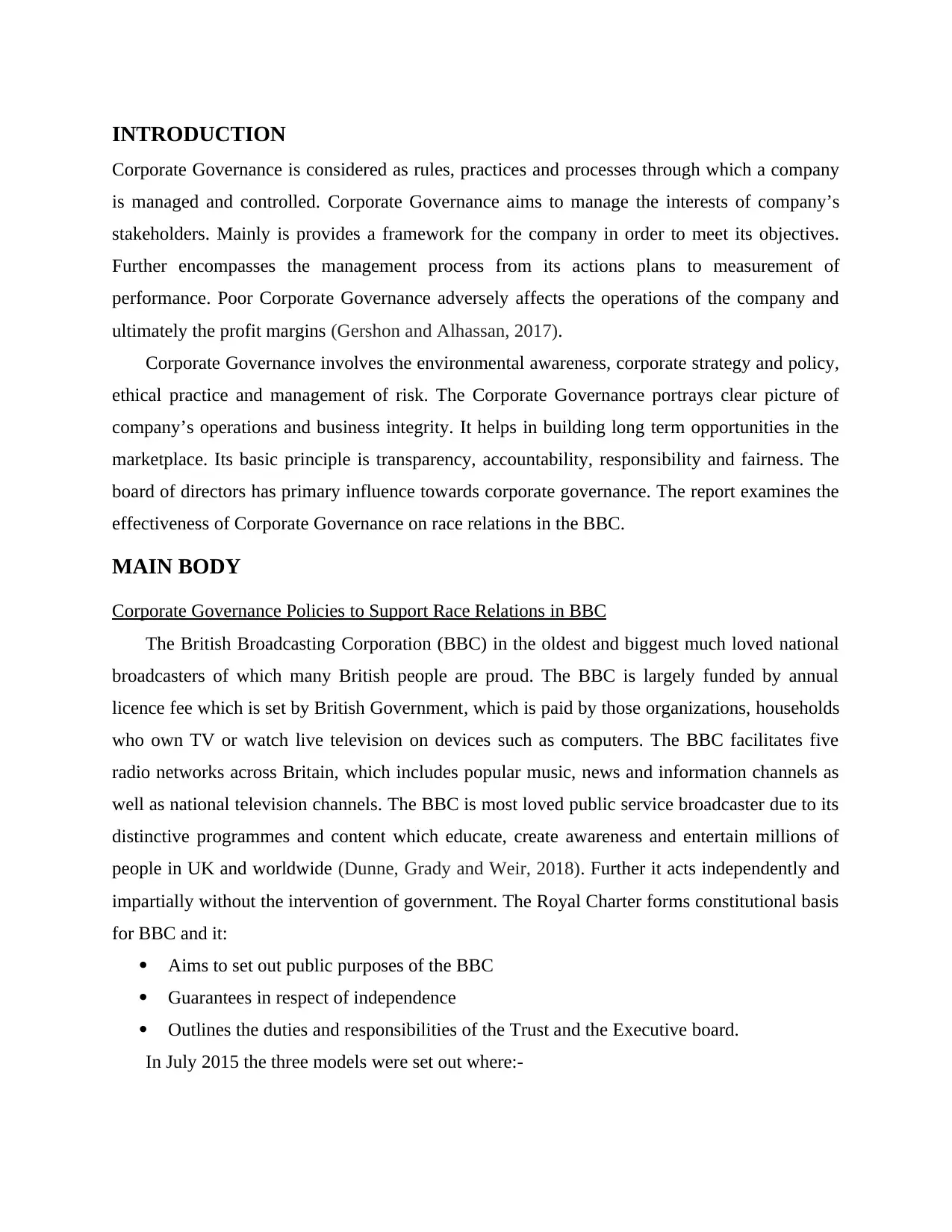
INTRODUCTION
Corporate Governance is considered as rules, practices and processes through which a company
is managed and controlled. Corporate Governance aims to manage the interests of company’s
stakeholders. Mainly is provides a framework for the company in order to meet its objectives.
Further encompasses the management process from its actions plans to measurement of
performance. Poor Corporate Governance adversely affects the operations of the company and
ultimately the profit margins (Gershon and Alhassan, 2017).
Corporate Governance involves the environmental awareness, corporate strategy and policy,
ethical practice and management of risk. The Corporate Governance portrays clear picture of
company’s operations and business integrity. It helps in building long term opportunities in the
marketplace. Its basic principle is transparency, accountability, responsibility and fairness. The
board of directors has primary influence towards corporate governance. The report examines the
effectiveness of Corporate Governance on race relations in the BBC.
MAIN BODY
Corporate Governance Policies to Support Race Relations in BBC
The British Broadcasting Corporation (BBC) in the oldest and biggest much loved national
broadcasters of which many British people are proud. The BBC is largely funded by annual
licence fee which is set by British Government, which is paid by those organizations, households
who own TV or watch live television on devices such as computers. The BBC facilitates five
radio networks across Britain, which includes popular music, news and information channels as
well as national television channels. The BBC is most loved public service broadcaster due to its
distinctive programmes and content which educate, create awareness and entertain millions of
people in UK and worldwide (Dunne, Grady and Weir, 2018). Further it acts independently and
impartially without the intervention of government. The Royal Charter forms constitutional basis
for BBC and it:
Aims to set out public purposes of the BBC
Guarantees in respect of independence
Outlines the duties and responsibilities of the Trust and the Executive board.
In July 2015 the three models were set out where:-
Corporate Governance is considered as rules, practices and processes through which a company
is managed and controlled. Corporate Governance aims to manage the interests of company’s
stakeholders. Mainly is provides a framework for the company in order to meet its objectives.
Further encompasses the management process from its actions plans to measurement of
performance. Poor Corporate Governance adversely affects the operations of the company and
ultimately the profit margins (Gershon and Alhassan, 2017).
Corporate Governance involves the environmental awareness, corporate strategy and policy,
ethical practice and management of risk. The Corporate Governance portrays clear picture of
company’s operations and business integrity. It helps in building long term opportunities in the
marketplace. Its basic principle is transparency, accountability, responsibility and fairness. The
board of directors has primary influence towards corporate governance. The report examines the
effectiveness of Corporate Governance on race relations in the BBC.
MAIN BODY
Corporate Governance Policies to Support Race Relations in BBC
The British Broadcasting Corporation (BBC) in the oldest and biggest much loved national
broadcasters of which many British people are proud. The BBC is largely funded by annual
licence fee which is set by British Government, which is paid by those organizations, households
who own TV or watch live television on devices such as computers. The BBC facilitates five
radio networks across Britain, which includes popular music, news and information channels as
well as national television channels. The BBC is most loved public service broadcaster due to its
distinctive programmes and content which educate, create awareness and entertain millions of
people in UK and worldwide (Dunne, Grady and Weir, 2018). Further it acts independently and
impartially without the intervention of government. The Royal Charter forms constitutional basis
for BBC and it:
Aims to set out public purposes of the BBC
Guarantees in respect of independence
Outlines the duties and responsibilities of the Trust and the Executive board.
In July 2015 the three models were set out where:-
⊘ This is a preview!⊘
Do you want full access?
Subscribe today to unlock all pages.

Trusted by 1+ million students worldwide
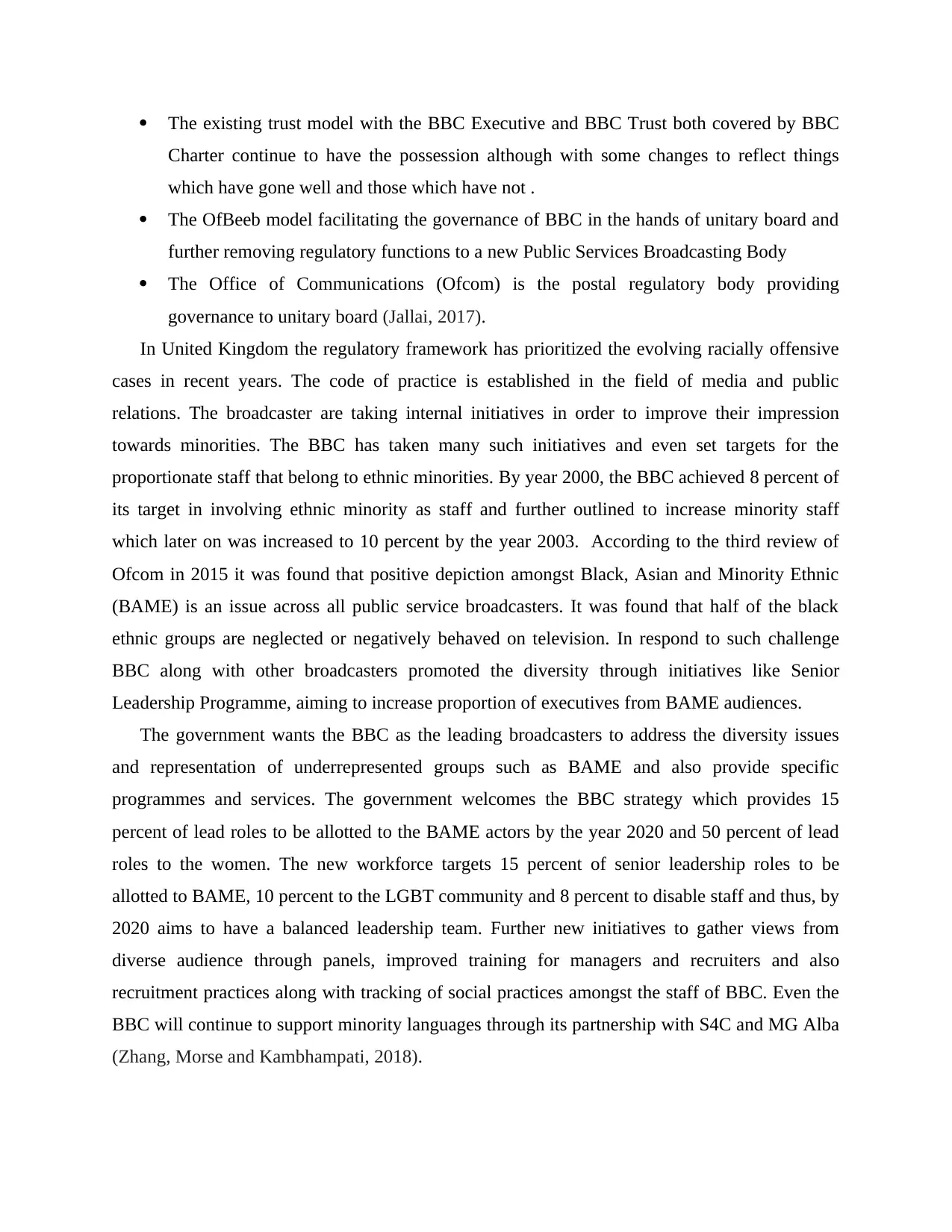
The existing trust model with the BBC Executive and BBC Trust both covered by BBC
Charter continue to have the possession although with some changes to reflect things
which have gone well and those which have not .
The OfBeeb model facilitating the governance of BBC in the hands of unitary board and
further removing regulatory functions to a new Public Services Broadcasting Body
The Office of Communications (Ofcom) is the postal regulatory body providing
governance to unitary board (Jallai, 2017).
In United Kingdom the regulatory framework has prioritized the evolving racially offensive
cases in recent years. The code of practice is established in the field of media and public
relations. The broadcaster are taking internal initiatives in order to improve their impression
towards minorities. The BBC has taken many such initiatives and even set targets for the
proportionate staff that belong to ethnic minorities. By year 2000, the BBC achieved 8 percent of
its target in involving ethnic minority as staff and further outlined to increase minority staff
which later on was increased to 10 percent by the year 2003. According to the third review of
Ofcom in 2015 it was found that positive depiction amongst Black, Asian and Minority Ethnic
(BAME) is an issue across all public service broadcasters. It was found that half of the black
ethnic groups are neglected or negatively behaved on television. In respond to such challenge
BBC along with other broadcasters promoted the diversity through initiatives like Senior
Leadership Programme, aiming to increase proportion of executives from BAME audiences.
The government wants the BBC as the leading broadcasters to address the diversity issues
and representation of underrepresented groups such as BAME and also provide specific
programmes and services. The government welcomes the BBC strategy which provides 15
percent of lead roles to be allotted to the BAME actors by the year 2020 and 50 percent of lead
roles to the women. The new workforce targets 15 percent of senior leadership roles to be
allotted to BAME, 10 percent to the LGBT community and 8 percent to disable staff and thus, by
2020 aims to have a balanced leadership team. Further new initiatives to gather views from
diverse audience through panels, improved training for managers and recruiters and also
recruitment practices along with tracking of social practices amongst the staff of BBC. Even the
BBC will continue to support minority languages through its partnership with S4C and MG Alba
(Zhang, Morse and Kambhampati, 2018).
Charter continue to have the possession although with some changes to reflect things
which have gone well and those which have not .
The OfBeeb model facilitating the governance of BBC in the hands of unitary board and
further removing regulatory functions to a new Public Services Broadcasting Body
The Office of Communications (Ofcom) is the postal regulatory body providing
governance to unitary board (Jallai, 2017).
In United Kingdom the regulatory framework has prioritized the evolving racially offensive
cases in recent years. The code of practice is established in the field of media and public
relations. The broadcaster are taking internal initiatives in order to improve their impression
towards minorities. The BBC has taken many such initiatives and even set targets for the
proportionate staff that belong to ethnic minorities. By year 2000, the BBC achieved 8 percent of
its target in involving ethnic minority as staff and further outlined to increase minority staff
which later on was increased to 10 percent by the year 2003. According to the third review of
Ofcom in 2015 it was found that positive depiction amongst Black, Asian and Minority Ethnic
(BAME) is an issue across all public service broadcasters. It was found that half of the black
ethnic groups are neglected or negatively behaved on television. In respond to such challenge
BBC along with other broadcasters promoted the diversity through initiatives like Senior
Leadership Programme, aiming to increase proportion of executives from BAME audiences.
The government wants the BBC as the leading broadcasters to address the diversity issues
and representation of underrepresented groups such as BAME and also provide specific
programmes and services. The government welcomes the BBC strategy which provides 15
percent of lead roles to be allotted to the BAME actors by the year 2020 and 50 percent of lead
roles to the women. The new workforce targets 15 percent of senior leadership roles to be
allotted to BAME, 10 percent to the LGBT community and 8 percent to disable staff and thus, by
2020 aims to have a balanced leadership team. Further new initiatives to gather views from
diverse audience through panels, improved training for managers and recruiters and also
recruitment practices along with tracking of social practices amongst the staff of BBC. Even the
BBC will continue to support minority languages through its partnership with S4C and MG Alba
(Zhang, Morse and Kambhampati, 2018).
Paraphrase This Document
Need a fresh take? Get an instant paraphrase of this document with our AI Paraphraser
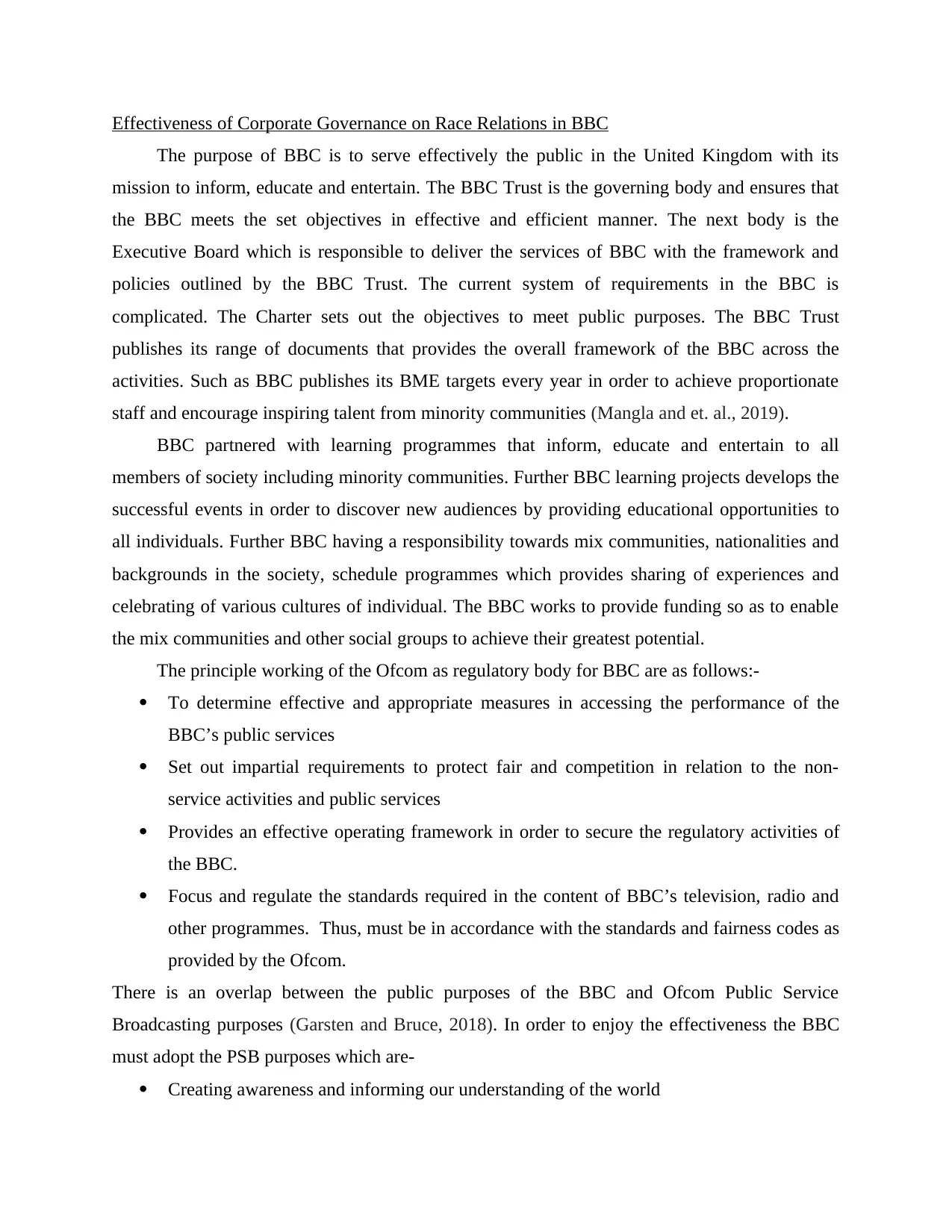
Effectiveness of Corporate Governance on Race Relations in BBC
The purpose of BBC is to serve effectively the public in the United Kingdom with its
mission to inform, educate and entertain. The BBC Trust is the governing body and ensures that
the BBC meets the set objectives in effective and efficient manner. The next body is the
Executive Board which is responsible to deliver the services of BBC with the framework and
policies outlined by the BBC Trust. The current system of requirements in the BBC is
complicated. The Charter sets out the objectives to meet public purposes. The BBC Trust
publishes its range of documents that provides the overall framework of the BBC across the
activities. Such as BBC publishes its BME targets every year in order to achieve proportionate
staff and encourage inspiring talent from minority communities (Mangla and et. al., 2019).
BBC partnered with learning programmes that inform, educate and entertain to all
members of society including minority communities. Further BBC learning projects develops the
successful events in order to discover new audiences by providing educational opportunities to
all individuals. Further BBC having a responsibility towards mix communities, nationalities and
backgrounds in the society, schedule programmes which provides sharing of experiences and
celebrating of various cultures of individual. The BBC works to provide funding so as to enable
the mix communities and other social groups to achieve their greatest potential.
The principle working of the Ofcom as regulatory body for BBC are as follows:-
To determine effective and appropriate measures in accessing the performance of the
BBC’s public services
Set out impartial requirements to protect fair and competition in relation to the non-
service activities and public services
Provides an effective operating framework in order to secure the regulatory activities of
the BBC.
Focus and regulate the standards required in the content of BBC’s television, radio and
other programmes. Thus, must be in accordance with the standards and fairness codes as
provided by the Ofcom.
There is an overlap between the public purposes of the BBC and Ofcom Public Service
Broadcasting purposes (Garsten and Bruce, 2018). In order to enjoy the effectiveness the BBC
must adopt the PSB purposes which are-
Creating awareness and informing our understanding of the world
The purpose of BBC is to serve effectively the public in the United Kingdom with its
mission to inform, educate and entertain. The BBC Trust is the governing body and ensures that
the BBC meets the set objectives in effective and efficient manner. The next body is the
Executive Board which is responsible to deliver the services of BBC with the framework and
policies outlined by the BBC Trust. The current system of requirements in the BBC is
complicated. The Charter sets out the objectives to meet public purposes. The BBC Trust
publishes its range of documents that provides the overall framework of the BBC across the
activities. Such as BBC publishes its BME targets every year in order to achieve proportionate
staff and encourage inspiring talent from minority communities (Mangla and et. al., 2019).
BBC partnered with learning programmes that inform, educate and entertain to all
members of society including minority communities. Further BBC learning projects develops the
successful events in order to discover new audiences by providing educational opportunities to
all individuals. Further BBC having a responsibility towards mix communities, nationalities and
backgrounds in the society, schedule programmes which provides sharing of experiences and
celebrating of various cultures of individual. The BBC works to provide funding so as to enable
the mix communities and other social groups to achieve their greatest potential.
The principle working of the Ofcom as regulatory body for BBC are as follows:-
To determine effective and appropriate measures in accessing the performance of the
BBC’s public services
Set out impartial requirements to protect fair and competition in relation to the non-
service activities and public services
Provides an effective operating framework in order to secure the regulatory activities of
the BBC.
Focus and regulate the standards required in the content of BBC’s television, radio and
other programmes. Thus, must be in accordance with the standards and fairness codes as
provided by the Ofcom.
There is an overlap between the public purposes of the BBC and Ofcom Public Service
Broadcasting purposes (Garsten and Bruce, 2018). In order to enjoy the effectiveness the BBC
must adopt the PSB purposes which are-
Creating awareness and informing our understanding of the world
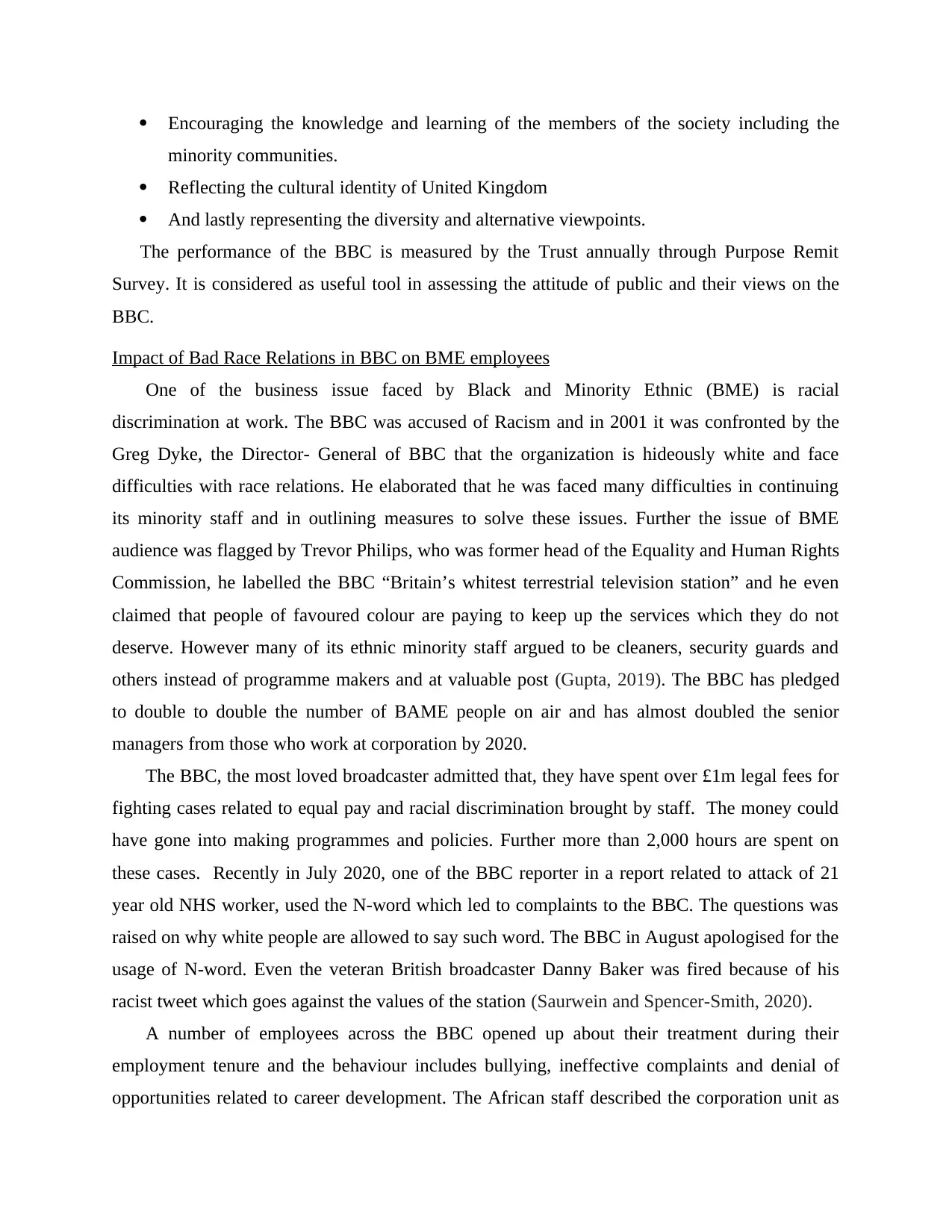
Encouraging the knowledge and learning of the members of the society including the
minority communities.
Reflecting the cultural identity of United Kingdom
And lastly representing the diversity and alternative viewpoints.
The performance of the BBC is measured by the Trust annually through Purpose Remit
Survey. It is considered as useful tool in assessing the attitude of public and their views on the
BBC.
Impact of Bad Race Relations in BBC on BME employees
One of the business issue faced by Black and Minority Ethnic (BME) is racial
discrimination at work. The BBC was accused of Racism and in 2001 it was confronted by the
Greg Dyke, the Director- General of BBC that the organization is hideously white and face
difficulties with race relations. He elaborated that he was faced many difficulties in continuing
its minority staff and in outlining measures to solve these issues. Further the issue of BME
audience was flagged by Trevor Philips, who was former head of the Equality and Human Rights
Commission, he labelled the BBC “Britain’s whitest terrestrial television station” and he even
claimed that people of favoured colour are paying to keep up the services which they do not
deserve. However many of its ethnic minority staff argued to be cleaners, security guards and
others instead of programme makers and at valuable post (Gupta, 2019). The BBC has pledged
to double to double the number of BAME people on air and has almost doubled the senior
managers from those who work at corporation by 2020.
The BBC, the most loved broadcaster admitted that, they have spent over £1m legal fees for
fighting cases related to equal pay and racial discrimination brought by staff. The money could
have gone into making programmes and policies. Further more than 2,000 hours are spent on
these cases. Recently in July 2020, one of the BBC reporter in a report related to attack of 21
year old NHS worker, used the N-word which led to complaints to the BBC. The questions was
raised on why white people are allowed to say such word. The BBC in August apologised for the
usage of N-word. Even the veteran British broadcaster Danny Baker was fired because of his
racist tweet which goes against the values of the station (Saurwein and Spencer-Smith, 2020).
A number of employees across the BBC opened up about their treatment during their
employment tenure and the behaviour includes bullying, ineffective complaints and denial of
opportunities related to career development. The African staff described the corporation unit as
minority communities.
Reflecting the cultural identity of United Kingdom
And lastly representing the diversity and alternative viewpoints.
The performance of the BBC is measured by the Trust annually through Purpose Remit
Survey. It is considered as useful tool in assessing the attitude of public and their views on the
BBC.
Impact of Bad Race Relations in BBC on BME employees
One of the business issue faced by Black and Minority Ethnic (BME) is racial
discrimination at work. The BBC was accused of Racism and in 2001 it was confronted by the
Greg Dyke, the Director- General of BBC that the organization is hideously white and face
difficulties with race relations. He elaborated that he was faced many difficulties in continuing
its minority staff and in outlining measures to solve these issues. Further the issue of BME
audience was flagged by Trevor Philips, who was former head of the Equality and Human Rights
Commission, he labelled the BBC “Britain’s whitest terrestrial television station” and he even
claimed that people of favoured colour are paying to keep up the services which they do not
deserve. However many of its ethnic minority staff argued to be cleaners, security guards and
others instead of programme makers and at valuable post (Gupta, 2019). The BBC has pledged
to double to double the number of BAME people on air and has almost doubled the senior
managers from those who work at corporation by 2020.
The BBC, the most loved broadcaster admitted that, they have spent over £1m legal fees for
fighting cases related to equal pay and racial discrimination brought by staff. The money could
have gone into making programmes and policies. Further more than 2,000 hours are spent on
these cases. Recently in July 2020, one of the BBC reporter in a report related to attack of 21
year old NHS worker, used the N-word which led to complaints to the BBC. The questions was
raised on why white people are allowed to say such word. The BBC in August apologised for the
usage of N-word. Even the veteran British broadcaster Danny Baker was fired because of his
racist tweet which goes against the values of the station (Saurwein and Spencer-Smith, 2020).
A number of employees across the BBC opened up about their treatment during their
employment tenure and the behaviour includes bullying, ineffective complaints and denial of
opportunities related to career development. The African staff described the corporation unit as
⊘ This is a preview!⊘
Do you want full access?
Subscribe today to unlock all pages.

Trusted by 1+ million students worldwide
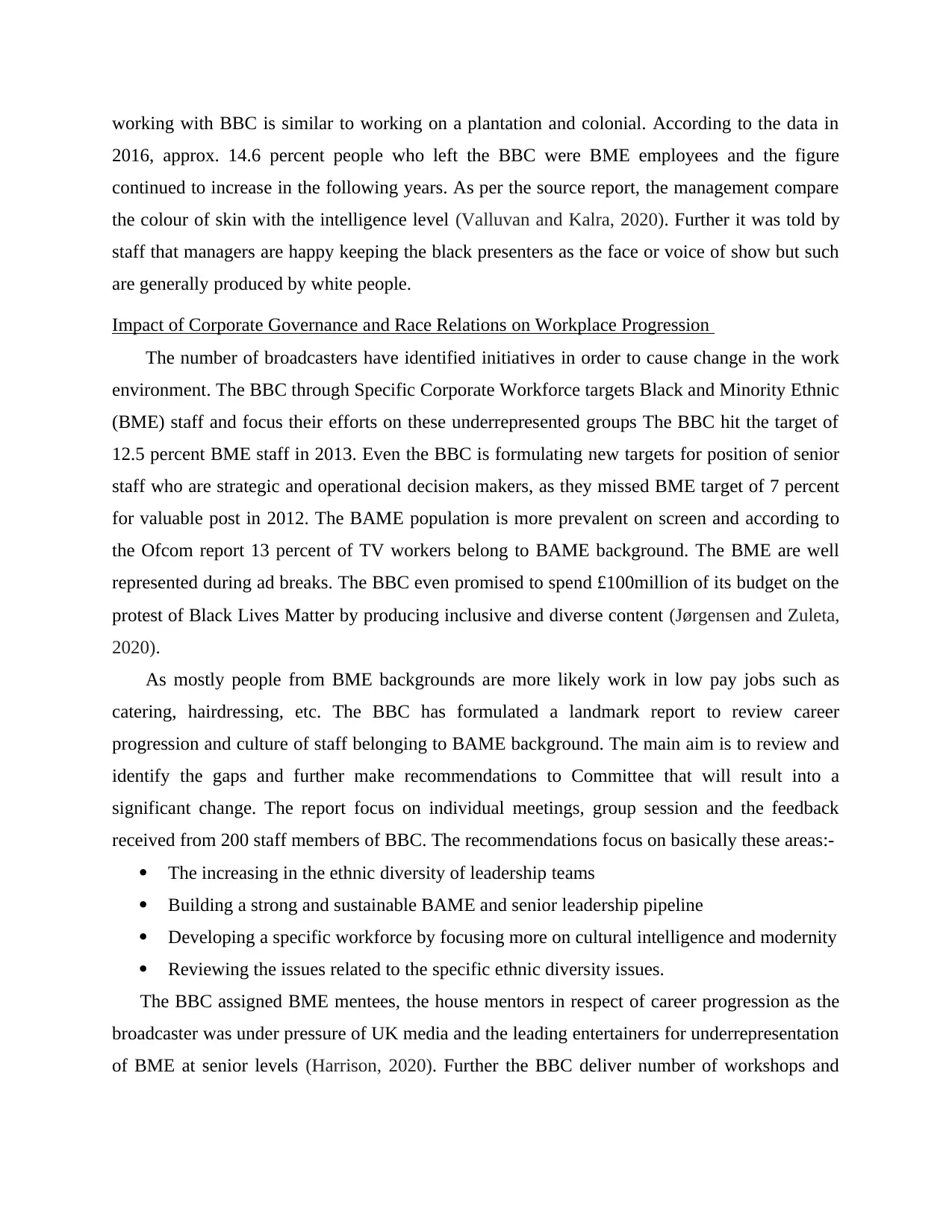
working with BBC is similar to working on a plantation and colonial. According to the data in
2016, approx. 14.6 percent people who left the BBC were BME employees and the figure
continued to increase in the following years. As per the source report, the management compare
the colour of skin with the intelligence level (Valluvan and Kalra, 2020). Further it was told by
staff that managers are happy keeping the black presenters as the face or voice of show but such
are generally produced by white people.
Impact of Corporate Governance and Race Relations on Workplace Progression
The number of broadcasters have identified initiatives in order to cause change in the work
environment. The BBC through Specific Corporate Workforce targets Black and Minority Ethnic
(BME) staff and focus their efforts on these underrepresented groups The BBC hit the target of
12.5 percent BME staff in 2013. Even the BBC is formulating new targets for position of senior
staff who are strategic and operational decision makers, as they missed BME target of 7 percent
for valuable post in 2012. The BAME population is more prevalent on screen and according to
the Ofcom report 13 percent of TV workers belong to BAME background. The BME are well
represented during ad breaks. The BBC even promised to spend £100million of its budget on the
protest of Black Lives Matter by producing inclusive and diverse content (Jørgensen and Zuleta,
2020).
As mostly people from BME backgrounds are more likely work in low pay jobs such as
catering, hairdressing, etc. The BBC has formulated a landmark report to review career
progression and culture of staff belonging to BAME background. The main aim is to review and
identify the gaps and further make recommendations to Committee that will result into a
significant change. The report focus on individual meetings, group session and the feedback
received from 200 staff members of BBC. The recommendations focus on basically these areas:-
The increasing in the ethnic diversity of leadership teams
Building a strong and sustainable BAME and senior leadership pipeline
Developing a specific workforce by focusing more on cultural intelligence and modernity
Reviewing the issues related to the specific ethnic diversity issues.
The BBC assigned BME mentees, the house mentors in respect of career progression as the
broadcaster was under pressure of UK media and the leading entertainers for underrepresentation
of BME at senior levels (Harrison, 2020). Further the BBC deliver number of workshops and
2016, approx. 14.6 percent people who left the BBC were BME employees and the figure
continued to increase in the following years. As per the source report, the management compare
the colour of skin with the intelligence level (Valluvan and Kalra, 2020). Further it was told by
staff that managers are happy keeping the black presenters as the face or voice of show but such
are generally produced by white people.
Impact of Corporate Governance and Race Relations on Workplace Progression
The number of broadcasters have identified initiatives in order to cause change in the work
environment. The BBC through Specific Corporate Workforce targets Black and Minority Ethnic
(BME) staff and focus their efforts on these underrepresented groups The BBC hit the target of
12.5 percent BME staff in 2013. Even the BBC is formulating new targets for position of senior
staff who are strategic and operational decision makers, as they missed BME target of 7 percent
for valuable post in 2012. The BAME population is more prevalent on screen and according to
the Ofcom report 13 percent of TV workers belong to BAME background. The BME are well
represented during ad breaks. The BBC even promised to spend £100million of its budget on the
protest of Black Lives Matter by producing inclusive and diverse content (Jørgensen and Zuleta,
2020).
As mostly people from BME backgrounds are more likely work in low pay jobs such as
catering, hairdressing, etc. The BBC has formulated a landmark report to review career
progression and culture of staff belonging to BAME background. The main aim is to review and
identify the gaps and further make recommendations to Committee that will result into a
significant change. The report focus on individual meetings, group session and the feedback
received from 200 staff members of BBC. The recommendations focus on basically these areas:-
The increasing in the ethnic diversity of leadership teams
Building a strong and sustainable BAME and senior leadership pipeline
Developing a specific workforce by focusing more on cultural intelligence and modernity
Reviewing the issues related to the specific ethnic diversity issues.
The BBC assigned BME mentees, the house mentors in respect of career progression as the
broadcaster was under pressure of UK media and the leading entertainers for underrepresentation
of BME at senior levels (Harrison, 2020). Further the BBC deliver number of workshops and
Paraphrase This Document
Need a fresh take? Get an instant paraphrase of this document with our AI Paraphraser
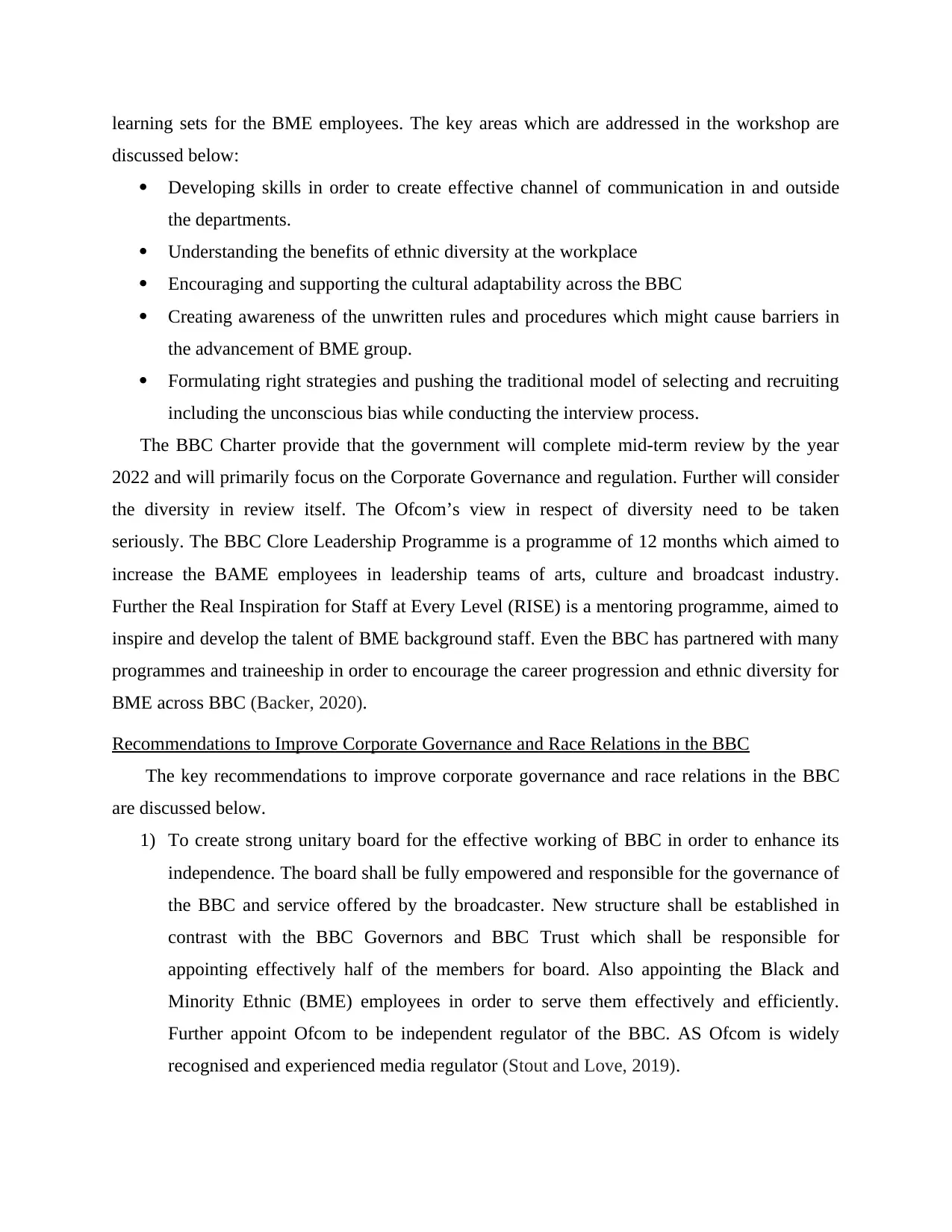
learning sets for the BME employees. The key areas which are addressed in the workshop are
discussed below:
Developing skills in order to create effective channel of communication in and outside
the departments.
Understanding the benefits of ethnic diversity at the workplace
Encouraging and supporting the cultural adaptability across the BBC
Creating awareness of the unwritten rules and procedures which might cause barriers in
the advancement of BME group.
Formulating right strategies and pushing the traditional model of selecting and recruiting
including the unconscious bias while conducting the interview process.
The BBC Charter provide that the government will complete mid-term review by the year
2022 and will primarily focus on the Corporate Governance and regulation. Further will consider
the diversity in review itself. The Ofcom’s view in respect of diversity need to be taken
seriously. The BBC Clore Leadership Programme is a programme of 12 months which aimed to
increase the BAME employees in leadership teams of arts, culture and broadcast industry.
Further the Real Inspiration for Staff at Every Level (RISE) is a mentoring programme, aimed to
inspire and develop the talent of BME background staff. Even the BBC has partnered with many
programmes and traineeship in order to encourage the career progression and ethnic diversity for
BME across BBC (Backer, 2020).
Recommendations to Improve Corporate Governance and Race Relations in the BBC
The key recommendations to improve corporate governance and race relations in the BBC
are discussed below.
1) To create strong unitary board for the effective working of BBC in order to enhance its
independence. The board shall be fully empowered and responsible for the governance of
the BBC and service offered by the broadcaster. New structure shall be established in
contrast with the BBC Governors and BBC Trust which shall be responsible for
appointing effectively half of the members for board. Also appointing the Black and
Minority Ethnic (BME) employees in order to serve them effectively and efficiently.
Further appoint Ofcom to be independent regulator of the BBC. AS Ofcom is widely
recognised and experienced media regulator (Stout and Love, 2019).
discussed below:
Developing skills in order to create effective channel of communication in and outside
the departments.
Understanding the benefits of ethnic diversity at the workplace
Encouraging and supporting the cultural adaptability across the BBC
Creating awareness of the unwritten rules and procedures which might cause barriers in
the advancement of BME group.
Formulating right strategies and pushing the traditional model of selecting and recruiting
including the unconscious bias while conducting the interview process.
The BBC Charter provide that the government will complete mid-term review by the year
2022 and will primarily focus on the Corporate Governance and regulation. Further will consider
the diversity in review itself. The Ofcom’s view in respect of diversity need to be taken
seriously. The BBC Clore Leadership Programme is a programme of 12 months which aimed to
increase the BAME employees in leadership teams of arts, culture and broadcast industry.
Further the Real Inspiration for Staff at Every Level (RISE) is a mentoring programme, aimed to
inspire and develop the talent of BME background staff. Even the BBC has partnered with many
programmes and traineeship in order to encourage the career progression and ethnic diversity for
BME across BBC (Backer, 2020).
Recommendations to Improve Corporate Governance and Race Relations in the BBC
The key recommendations to improve corporate governance and race relations in the BBC
are discussed below.
1) To create strong unitary board for the effective working of BBC in order to enhance its
independence. The board shall be fully empowered and responsible for the governance of
the BBC and service offered by the broadcaster. New structure shall be established in
contrast with the BBC Governors and BBC Trust which shall be responsible for
appointing effectively half of the members for board. Also appointing the Black and
Minority Ethnic (BME) employees in order to serve them effectively and efficiently.
Further appoint Ofcom to be independent regulator of the BBC. AS Ofcom is widely
recognised and experienced media regulator (Stout and Love, 2019).
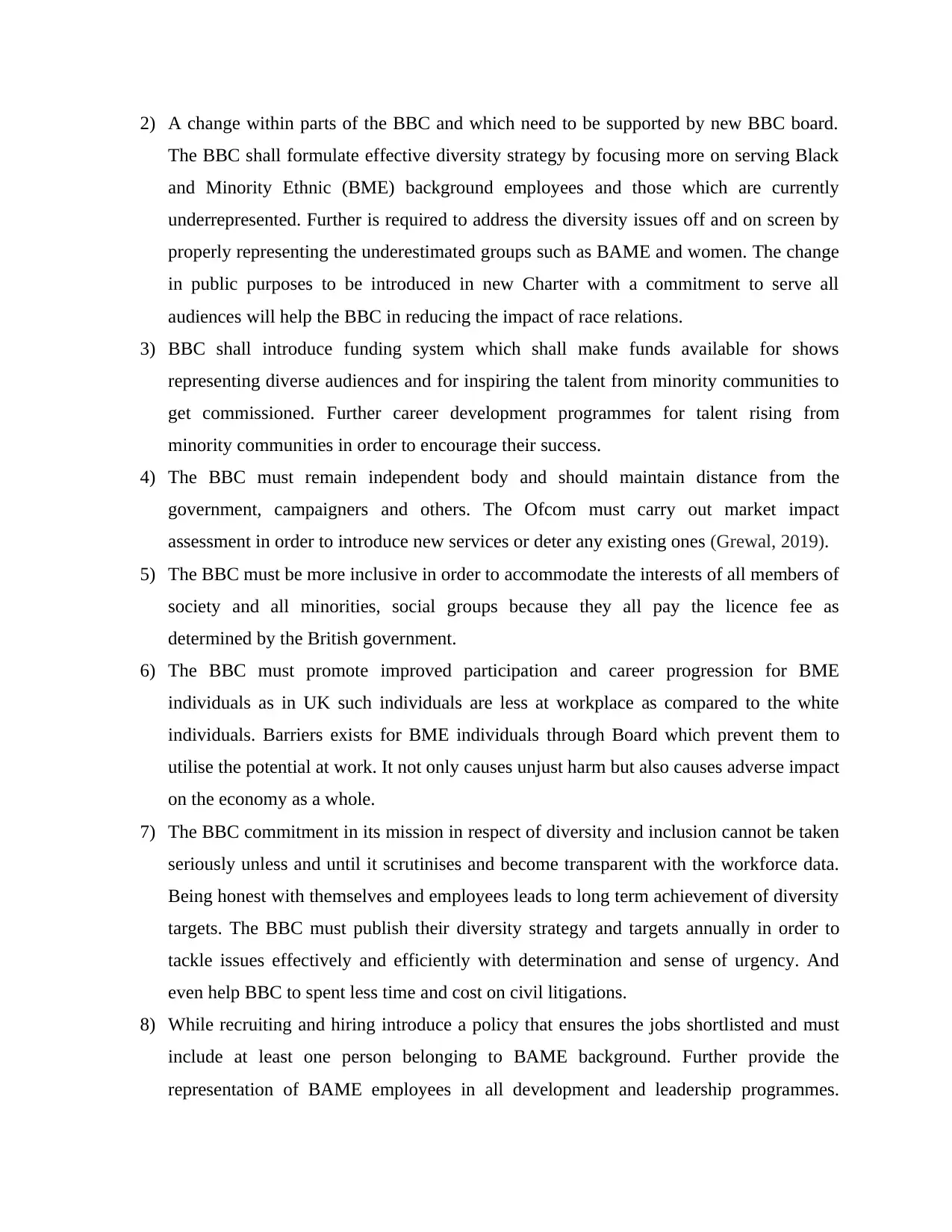
2) A change within parts of the BBC and which need to be supported by new BBC board.
The BBC shall formulate effective diversity strategy by focusing more on serving Black
and Minority Ethnic (BME) background employees and those which are currently
underrepresented. Further is required to address the diversity issues off and on screen by
properly representing the underestimated groups such as BAME and women. The change
in public purposes to be introduced in new Charter with a commitment to serve all
audiences will help the BBC in reducing the impact of race relations.
3) BBC shall introduce funding system which shall make funds available for shows
representing diverse audiences and for inspiring the talent from minority communities to
get commissioned. Further career development programmes for talent rising from
minority communities in order to encourage their success.
4) The BBC must remain independent body and should maintain distance from the
government, campaigners and others. The Ofcom must carry out market impact
assessment in order to introduce new services or deter any existing ones (Grewal, 2019).
5) The BBC must be more inclusive in order to accommodate the interests of all members of
society and all minorities, social groups because they all pay the licence fee as
determined by the British government.
6) The BBC must promote improved participation and career progression for BME
individuals as in UK such individuals are less at workplace as compared to the white
individuals. Barriers exists for BME individuals through Board which prevent them to
utilise the potential at work. It not only causes unjust harm but also causes adverse impact
on the economy as a whole.
7) The BBC commitment in its mission in respect of diversity and inclusion cannot be taken
seriously unless and until it scrutinises and become transparent with the workforce data.
Being honest with themselves and employees leads to long term achievement of diversity
targets. The BBC must publish their diversity strategy and targets annually in order to
tackle issues effectively and efficiently with determination and sense of urgency. And
even help BBC to spent less time and cost on civil litigations.
8) While recruiting and hiring introduce a policy that ensures the jobs shortlisted and must
include at least one person belonging to BAME background. Further provide the
representation of BAME employees in all development and leadership programmes.
The BBC shall formulate effective diversity strategy by focusing more on serving Black
and Minority Ethnic (BME) background employees and those which are currently
underrepresented. Further is required to address the diversity issues off and on screen by
properly representing the underestimated groups such as BAME and women. The change
in public purposes to be introduced in new Charter with a commitment to serve all
audiences will help the BBC in reducing the impact of race relations.
3) BBC shall introduce funding system which shall make funds available for shows
representing diverse audiences and for inspiring the talent from minority communities to
get commissioned. Further career development programmes for talent rising from
minority communities in order to encourage their success.
4) The BBC must remain independent body and should maintain distance from the
government, campaigners and others. The Ofcom must carry out market impact
assessment in order to introduce new services or deter any existing ones (Grewal, 2019).
5) The BBC must be more inclusive in order to accommodate the interests of all members of
society and all minorities, social groups because they all pay the licence fee as
determined by the British government.
6) The BBC must promote improved participation and career progression for BME
individuals as in UK such individuals are less at workplace as compared to the white
individuals. Barriers exists for BME individuals through Board which prevent them to
utilise the potential at work. It not only causes unjust harm but also causes adverse impact
on the economy as a whole.
7) The BBC commitment in its mission in respect of diversity and inclusion cannot be taken
seriously unless and until it scrutinises and become transparent with the workforce data.
Being honest with themselves and employees leads to long term achievement of diversity
targets. The BBC must publish their diversity strategy and targets annually in order to
tackle issues effectively and efficiently with determination and sense of urgency. And
even help BBC to spent less time and cost on civil litigations.
8) While recruiting and hiring introduce a policy that ensures the jobs shortlisted and must
include at least one person belonging to BAME background. Further provide the
representation of BAME employees in all development and leadership programmes.
⊘ This is a preview!⊘
Do you want full access?
Subscribe today to unlock all pages.

Trusted by 1+ million students worldwide
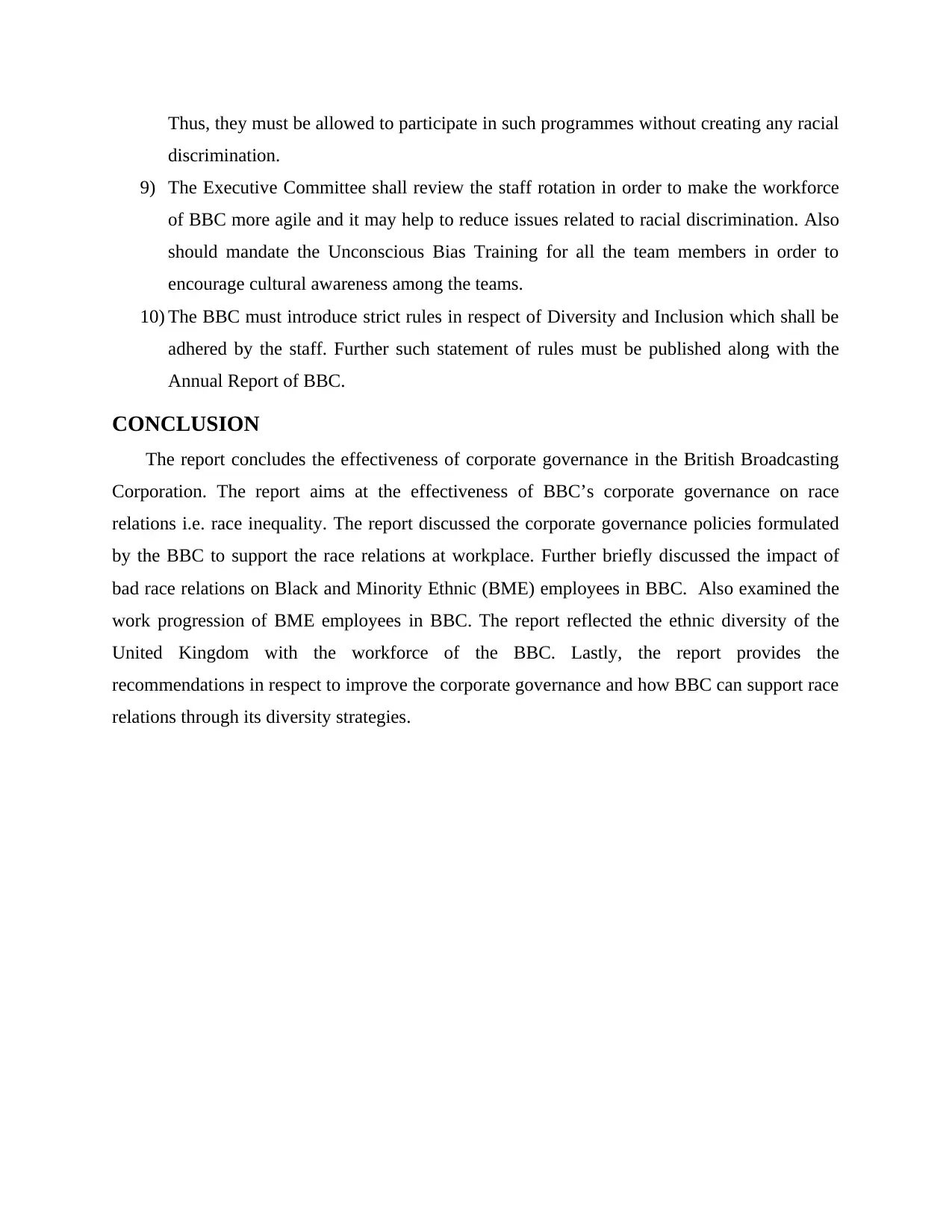
Thus, they must be allowed to participate in such programmes without creating any racial
discrimination.
9) The Executive Committee shall review the staff rotation in order to make the workforce
of BBC more agile and it may help to reduce issues related to racial discrimination. Also
should mandate the Unconscious Bias Training for all the team members in order to
encourage cultural awareness among the teams.
10) The BBC must introduce strict rules in respect of Diversity and Inclusion which shall be
adhered by the staff. Further such statement of rules must be published along with the
Annual Report of BBC.
CONCLUSION
The report concludes the effectiveness of corporate governance in the British Broadcasting
Corporation. The report aims at the effectiveness of BBC’s corporate governance on race
relations i.e. race inequality. The report discussed the corporate governance policies formulated
by the BBC to support the race relations at workplace. Further briefly discussed the impact of
bad race relations on Black and Minority Ethnic (BME) employees in BBC. Also examined the
work progression of BME employees in BBC. The report reflected the ethnic diversity of the
United Kingdom with the workforce of the BBC. Lastly, the report provides the
recommendations in respect to improve the corporate governance and how BBC can support race
relations through its diversity strategies.
discrimination.
9) The Executive Committee shall review the staff rotation in order to make the workforce
of BBC more agile and it may help to reduce issues related to racial discrimination. Also
should mandate the Unconscious Bias Training for all the team members in order to
encourage cultural awareness among the teams.
10) The BBC must introduce strict rules in respect of Diversity and Inclusion which shall be
adhered by the staff. Further such statement of rules must be published along with the
Annual Report of BBC.
CONCLUSION
The report concludes the effectiveness of corporate governance in the British Broadcasting
Corporation. The report aims at the effectiveness of BBC’s corporate governance on race
relations i.e. race inequality. The report discussed the corporate governance policies formulated
by the BBC to support the race relations at workplace. Further briefly discussed the impact of
bad race relations on Black and Minority Ethnic (BME) employees in BBC. Also examined the
work progression of BME employees in BBC. The report reflected the ethnic diversity of the
United Kingdom with the workforce of the BBC. Lastly, the report provides the
recommendations in respect to improve the corporate governance and how BBC can support race
relations through its diversity strategies.
Paraphrase This Document
Need a fresh take? Get an instant paraphrase of this document with our AI Paraphraser
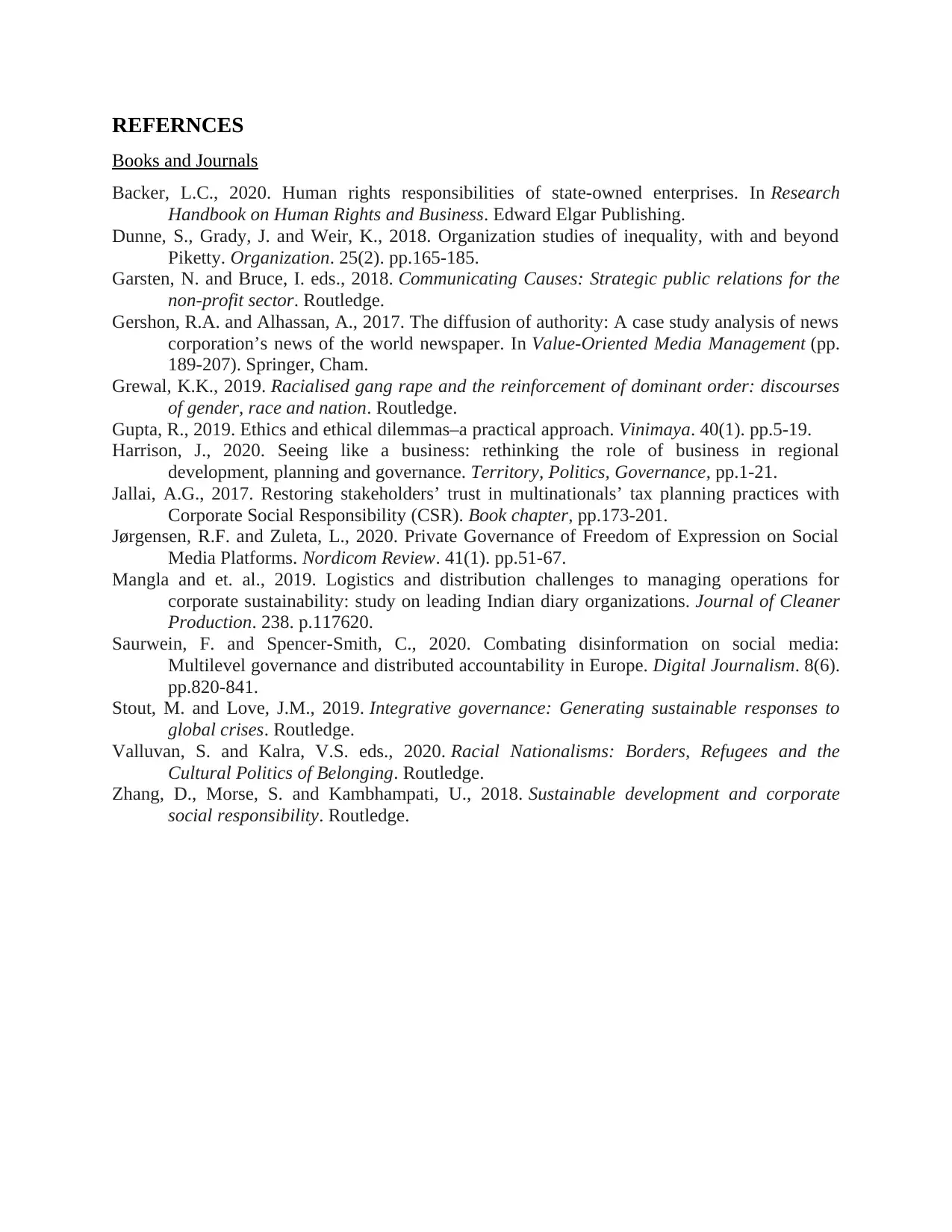
REFERNCES
Books and Journals
Backer, L.C., 2020. Human rights responsibilities of state-owned enterprises. In Research
Handbook on Human Rights and Business. Edward Elgar Publishing.
Dunne, S., Grady, J. and Weir, K., 2018. Organization studies of inequality, with and beyond
Piketty. Organization. 25(2). pp.165-185.
Garsten, N. and Bruce, I. eds., 2018. Communicating Causes: Strategic public relations for the
non-profit sector. Routledge.
Gershon, R.A. and Alhassan, A., 2017. The diffusion of authority: A case study analysis of news
corporation’s news of the world newspaper. In Value-Oriented Media Management (pp.
189-207). Springer, Cham.
Grewal, K.K., 2019. Racialised gang rape and the reinforcement of dominant order: discourses
of gender, race and nation. Routledge.
Gupta, R., 2019. Ethics and ethical dilemmas–a practical approach. Vinimaya. 40(1). pp.5-19.
Harrison, J., 2020. Seeing like a business: rethinking the role of business in regional
development, planning and governance. Territory, Politics, Governance, pp.1-21.
Jallai, A.G., 2017. Restoring stakeholders’ trust in multinationals’ tax planning practices with
Corporate Social Responsibility (CSR). Book chapter, pp.173-201.
Jørgensen, R.F. and Zuleta, L., 2020. Private Governance of Freedom of Expression on Social
Media Platforms. Nordicom Review. 41(1). pp.51-67.
Mangla and et. al., 2019. Logistics and distribution challenges to managing operations for
corporate sustainability: study on leading Indian diary organizations. Journal of Cleaner
Production. 238. p.117620.
Saurwein, F. and Spencer-Smith, C., 2020. Combating disinformation on social media:
Multilevel governance and distributed accountability in Europe. Digital Journalism. 8(6).
pp.820-841.
Stout, M. and Love, J.M., 2019. Integrative governance: Generating sustainable responses to
global crises. Routledge.
Valluvan, S. and Kalra, V.S. eds., 2020. Racial Nationalisms: Borders, Refugees and the
Cultural Politics of Belonging. Routledge.
Zhang, D., Morse, S. and Kambhampati, U., 2018. Sustainable development and corporate
social responsibility. Routledge.
Books and Journals
Backer, L.C., 2020. Human rights responsibilities of state-owned enterprises. In Research
Handbook on Human Rights and Business. Edward Elgar Publishing.
Dunne, S., Grady, J. and Weir, K., 2018. Organization studies of inequality, with and beyond
Piketty. Organization. 25(2). pp.165-185.
Garsten, N. and Bruce, I. eds., 2018. Communicating Causes: Strategic public relations for the
non-profit sector. Routledge.
Gershon, R.A. and Alhassan, A., 2017. The diffusion of authority: A case study analysis of news
corporation’s news of the world newspaper. In Value-Oriented Media Management (pp.
189-207). Springer, Cham.
Grewal, K.K., 2019. Racialised gang rape and the reinforcement of dominant order: discourses
of gender, race and nation. Routledge.
Gupta, R., 2019. Ethics and ethical dilemmas–a practical approach. Vinimaya. 40(1). pp.5-19.
Harrison, J., 2020. Seeing like a business: rethinking the role of business in regional
development, planning and governance. Territory, Politics, Governance, pp.1-21.
Jallai, A.G., 2017. Restoring stakeholders’ trust in multinationals’ tax planning practices with
Corporate Social Responsibility (CSR). Book chapter, pp.173-201.
Jørgensen, R.F. and Zuleta, L., 2020. Private Governance of Freedom of Expression on Social
Media Platforms. Nordicom Review. 41(1). pp.51-67.
Mangla and et. al., 2019. Logistics and distribution challenges to managing operations for
corporate sustainability: study on leading Indian diary organizations. Journal of Cleaner
Production. 238. p.117620.
Saurwein, F. and Spencer-Smith, C., 2020. Combating disinformation on social media:
Multilevel governance and distributed accountability in Europe. Digital Journalism. 8(6).
pp.820-841.
Stout, M. and Love, J.M., 2019. Integrative governance: Generating sustainable responses to
global crises. Routledge.
Valluvan, S. and Kalra, V.S. eds., 2020. Racial Nationalisms: Borders, Refugees and the
Cultural Politics of Belonging. Routledge.
Zhang, D., Morse, S. and Kambhampati, U., 2018. Sustainable development and corporate
social responsibility. Routledge.
1 out of 11
Related Documents
Your All-in-One AI-Powered Toolkit for Academic Success.
+13062052269
info@desklib.com
Available 24*7 on WhatsApp / Email
![[object Object]](/_next/static/media/star-bottom.7253800d.svg)
Unlock your academic potential
Copyright © 2020–2026 A2Z Services. All Rights Reserved. Developed and managed by ZUCOL.



